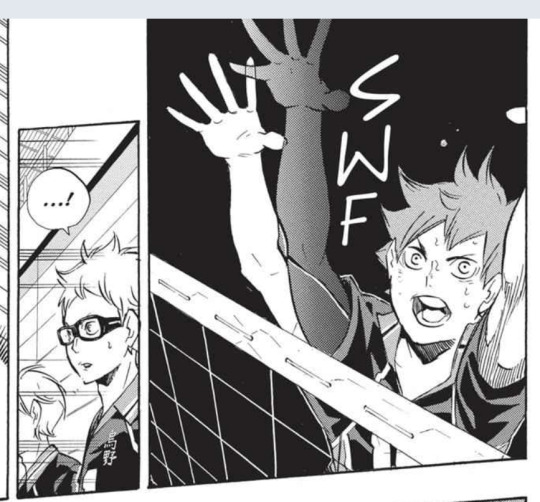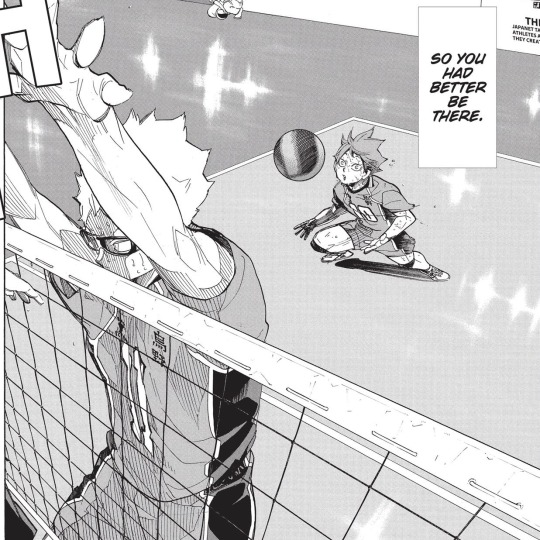Text

And Tsukishima notices it instantly again! Sun and moon coded indeed. But crows are carnivores that feed on everyone including their teammates and you can see Tsukishima filing this away for later use
27 notes
·
View notes
Text

とおい いえ
にどと もどらず
この ちょう は。
0 notes
Text

0 notes
Text
A Study of Haikyuu!! Character Names
Ok guys I don’t know if a post like this has gone around, maybe it has, maybe I am saying things people already know because I’m new to this fandom, but seriously. I had noticed that Hinata’s and Kageyama’s names were particularly clever in terms of reflecting their characters so I started actually digging into what all the kanji for all the names mean and guys this is delicious. I can’t help it, I have to share.
Hinata Shouyou: Hinata’s name is way too obvious but also really cute. His last name 日向 (Hinata) literally means “to face the sun” or “to head towards the sun” which, yes. While 日向 (Hinata) is the first hit I get when I do the turn-these-kana-into-kanji thing, making me think it’s pretty common, his given name 翔陽 (Shouyou) seems to not be, which means the kanji were particularly chosen (like most of these names, honestly). 翔 (shou) means to soar, and 陽 (you) means sunshine. So Hinata’s just sunshine all over.
Kageyama Tobio: 影山 (Kageyama) literally means shadowed mountain, or dark mountain, with 影 being shadow (or silhouette) and 山 being mountain. Basically a massive presence. Meanwhile, 飛雄 (Tobio) is another completely made up name, with 飛 (tobi) meaning to fly, and 雄 (o) meaning… well, man. But it’s not your normal ‘man’ character, which is 男. The character in Tobio’s name also has the meaning of ‘hero’ behind it. Also, I think there is some of the concept of “the shade exists because of the sun,” or like, maybe that’s just me, I don’t know.
Sawamura Daichi: 澤村 (Sawamura) is, again, not unheard of as a last name. It literally means “swamp village” which comes across a little oddly to me, especially since 大地 (Daichi) means “great earth,” which fits him well, being the foundation of the team.
Sugawara Koushi: This one, like Daichi’s name, is a little more obtuse. The last name at least. 菅原 (Sugawara) breaks down to mean “sedge field.” Sedge (I had to look it up) is apparently a plant that grows in wet areas. Like…. swamps!?? I dunno, ok. But his first name 孝支 (Koushi) is once again a completely made up name. 孝 (kou) is the character for filial devotion/piety/respect, whereas 支 (shi) means to support. This kills me ok.
Azumane Asahi: I actually started this post because of Asahi and Noya in particular because THIS KILLS ME THE MOST (except for Ukai but I’ll get there) so ok. Ok. 東峰 (Azumane) breaks down into 東 (east) and 峰 (peak/summit), so we’re talking about the tip top of an eastern mountain ok. His given name, 旭, means daybreak, or the sun rising.
Nishinoya Yuu: Are you even ready for this I was not. Noya’s kanji are 西谷 (nishinoya) which lit translate to… 西 (west) 谷 (valley). Plus then we throw in his given name of 夕 (yuu) which, guys, guys, it means “evening.” They are ABSOLUTE OPPOSITES how is this not the most fucking perfect thing ughh.
Tanaka Ryuunosuke: Comparatively, Tanaka gets a pretty boring name. I mean, his last name 田中 (tanaka) (middle of the rice field) is one of the most common last names in Japan, so I guess the purpose was to try to make him an everyman, in a sense. Although he does have 龍 (ryuu), or “dragon,” in his first name, which I think feeds the character, he also has 之介 (nosuke) at the end, which is another common suffix for boys and sounds very traditional.
Tsukishima Kei: I find Tsukishima’s name actually quite interesting. I think everyone already knows about how he has 月 (tsuki) “moon” in his last name, naturally, making him Hinata’s opposite. 島 (shima), just to be thorough, means “island.” Meanwhile, what I find interesting is that his first name, 蛍 (kei), is the character for fireflies. I think that suits his personality to a T—lights on, lights off.
Yamaguchi Tadashi: Yamaguchi also has a super common last name: 山口 (yamaguchi) literally means the entrance to the mountain. More importantly, his first name, 忠 (tadashi), is the character for loyalty and devotion.
I’m gonna skip a few here because I could do everybody’s names but there are like a million characters, so I’m just gonna make sure to also do…
Shimizu Kiyoko: 清水 (shimizu) is an interesting last name because there’s a temple in Kyoto by the name of 清水寺, though it’s pronounced Kiyomizudera. What probably isn’t surprising is that 清 (shi) means “purity,” and 水 (mizu) means water. Her given name completely echoes the intent of her last name, with 潔 (kiyo) meaning “undefiled/pure/clean”, and 子 (ko) meaning “girl/child.” “ko” is also an incredibly traditional sounding piece of girls’ names.
Yachi Hitoka: 谷地 (yachi) are both kanji that have come up in other names; Daichi’s and Noya’s, actually. Once again, 谷 (ya) is valley, and 地 (chi) is earth. Meanwhile, 仁 (hito) means “benevolence/humanity/virtue”, while 花 (ka) means “flower”.
Ok last but not least this really kills me it’s so blatant
Ukai Keishin: Totally 100% made up name here. 烏養 (ukai) breaks down into 烏 (u) which means crow and 養 (I assume this is ‘kai’ but tbh it doesn’t look like that’s a normal reading) which means to “bring up/foster/nurture.” So his last name means to be a father figure to crows. Then his first name 繋心 (keishin) breaks down to 繋 (kei) “to fasten/tie” and 心 (shin) “heart/mind/soul” so this guy’s name QUITE LITERALLY means that he brings the spirits of his little baby crows together. I MEAN.
And obligatory statement: take this all with a grain of salt, I know Japanese well enough that I can say this is close to being accurate but I can still make mistakes, and I welcome any comments or corrections or thoughts!
691 notes
·
View notes
Text
the thing about kageyama is that he was never mean. and the show works really hard to make it clear that he was never malicious or mean spirited. and so he doesn’t have to have a redemption arc, his character arc becomes centered around understanding, trust, and love. he isn’t learning how to be kind, he’s always been kind. he is learning how to see other people and learning how to know other people. he always loved volleyball but now he loves his team. and he really really loves hinata
4K notes
·
View notes
Text

Hinata : honest
Kageyama : flexible mind
Both have something invaluable which the other lacks. It's great that Daichi was able to make that clear to Hinata so early on. We later see how both continue to grow from there on, influencing each other.
Kageyama becomes honest first with his team, growing more transparent about his needs by vocalizing to Nishinoya about how he should get of the way after his receive. This outspoken behaviour and the Karasuno team's acceptance of that, allows Kageyama to grow into himself. Gradually his brash words also soften. His harsh comments go from criticism to genuine suggestions for the team to improve.
Kageyama's flexibility becomes apparent in Hinata during the training camp he crashes into in 3rd season. He knows he can't keep relying on Kageyama to draw out his power, so he finds ways to become independent. It starts with Hinata improving his receives, and by the Brazil arc, Hinata is also a seasoned setter.
#Haikyuu manga spoilers#Manga#Spoilers#Haikyuu!!#Hinata#Kageyama#Daichi#dad daichi helping shoyo get some practice in during lunchtime#truly captain material#Haikyuu manga musings
2 notes
·
View notes
Text

輝く目 未来をはっきり 見てしまう。
#weekly haiku challenge#01#Kita's eyes#Haikyuu!!#週間の習慣#ハイキュー#俳句#ハイキューのはいく#www#a haiku on Haikyuu lol
3 notes
·
View notes

